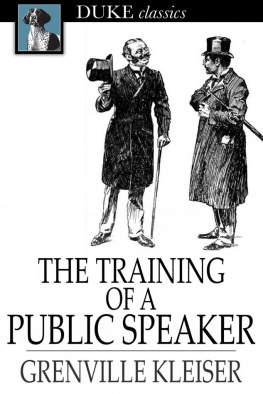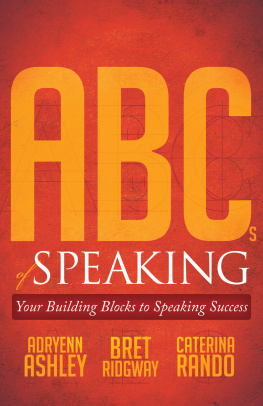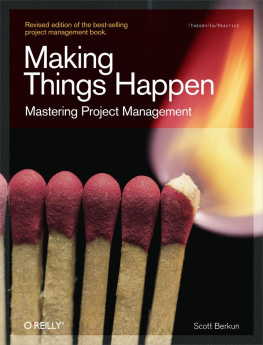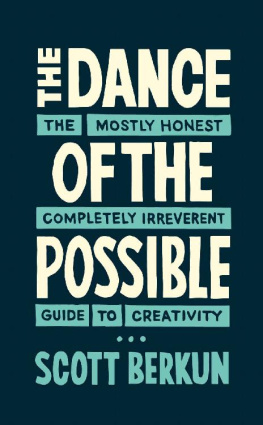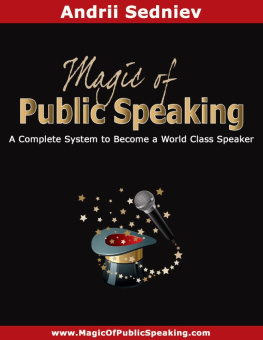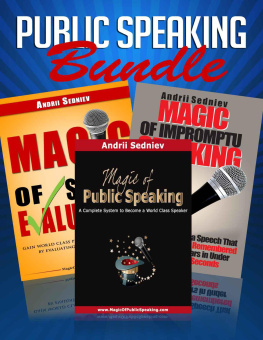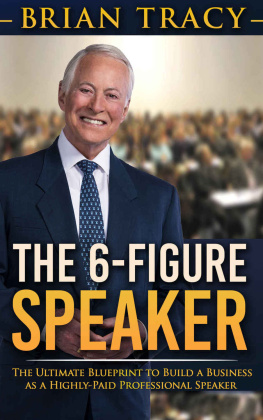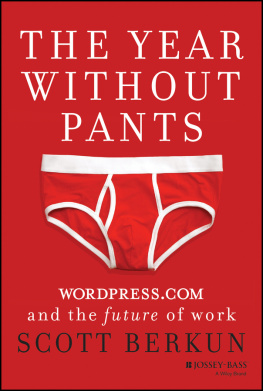This book is highly opinionated, personal, and full of behind-the-scenes stories. You may not like this. Some people like seeing how sausage is made, but many do not.
Although everything in this book is true and written to be useful, if you dont always want to hear the truth, this book might not be for you.
This book is written with faith in the idea that if we all spoke thoughtfully and listened carefully, the world would be a better place.
Chapter 1. I cant see you naked
Im on a long flight from Seattle to Belgium, and the woman sitting next to me starts a conversation. Despite hiding behind the book in my hands, Im now forced into a common and sometimes unfortunate air-travel situation: the gamble of talking to a stranger I cant escape from. While its fun to be near someone interesting for occasional chats, being stuck next to a person who will not stop talking for nine hours is my idea of hell. (And you never know which it will be until after you start talking, when its too late.) Not wanting to be rude, I say hello. She asks what I do for a living, at which I pause. Ive been down this bumpy conversational road many times. You see, I have two answers, and both suck.
The best answer I have is Im a writer. I write books and essays. But saying Im a writer is bad because people get excited I might be Dan Brown, John Grisham, or Dave Eggers, someone famous they can tell their friends they met. When they learn Im one of the millions of writers theyve never heard ofand not someone whose novel was turned into a blockbuster moviethey fall into a kind of disappointment never experienced by people who are employed as lawyers, plumbers, or even assistant fry cooks at McDonalds.
My other choice is worse, which is to say Im a public speaker. If you tell people youre a public speaker, theyll assume one of three bad things:
Youre a motivational speaker who wears bad suits, sweats too much, and dreams about Tony Robbins.
Youre a high priest in a cult and will soon try to convert them to your religion.
Youre single, unemployed, and live in a van down by the river.
I dont want to call myself a public speaker. Professors, executives, pundits, and politicians all spend much of their professional lives speaking in public, but they dont call themselves public speakers either. And for good reason. Public speaking is a form of expression. You have to do it about a topic, and whatever that topic is defines you better than the actual speaking does. But I speak about the things I write about, which can be just about anything. Calling myself a freelance thinkeras vacuous as it soundsis accurate, but if I say it, someone would surely think Im unemployed, just as I would if a stranger on an airplane said it to me. Yet freelance thinking is why Im on the plane. I quit my regular job years ago, wrote two bestselling books, and have been hired to fly to Brussels to speak about ideas from those books.
I explain all this to my newfound flight friend. Her first question, one I often hear at this point in conversations, is: When youre giving a lecture, do you imagine everyone in the room naked? Shes half-joking but also eyeing me strangely. She wants an answer. I want to say of course I dont. No one does. Youre never told to imagine people naked at your job interview or at the dentist, and for good reason. Being naked or imagining naked people in the daytime makes most things more complicated, not less, which is one of the reasons we invented clothes. Despite it being very bad advice, its somehow the one universally known tip for public speaking.
I asked many experts, and not one knew who first offered this advice, though the best guess is Winston ] who may have claimed imagining the audience naked worked for him. But he was also known for drinking a bottle of champagne and a fifth of brandy or more a day. With that much alcohol, you might need to imagine people naked just to stay awake. For us mere mortals (Churchill had an amazing tolerance for alcohol), you wont find a single public-speaking expert recommending thoughts of naked people, nor a fifth of brandy. Yet, if you tell a friend youre nervous about a presentation you have to give at work tomorrow, naked people will be mentioned within 30 seconds. I cant explain why. It seems bad advice thats fun will always be better known than good advice thats dullno matter how useless that fun advice is.
In hundreds of lectures around the world, Ive done most of the scary, tragic, embarrassing things that terrify people. Ive been heckled by drunken crowds in a Boston bar. Ive lectured to empty seats, and a bored janitor, in New York City. Ive had a laptop crash in a Moscow auditorium; a microphone die at a keynote speech in San Jose; and Ive watched helplessly as the Parisian executives who hired me fell asleep in the conference room while I was speaking. The secret to coping with these events is to realize everyone forgets about them after they happenexcept for one person: me. No one else really cares that much.
When Im up there speaking, I remind myself of the last time I was in row 25 of the auditorium, or in the corner of a boardroom, or back in some stupid class in high school, desperately trying not to daydream or fall asleep. Most people listening to presentations around the world right now are hoping their speakers will end soon. Thats all they want. Theyre not judging as much as you think, because they dont care as much as you think. Knowing this helps enormously. If some disaster happens, something explodes or I trip and fall, Ill have more attention from the audience than I probably had 30 seconds before. And if I dont care that much about my disaster, I can use the attention Ive earned and do something good with itwhatever I say next, they are sure to remember. And if nothing else, my tragedy will give everyone in the audience a funny story to share. The laughter from that story will do more good for the world than anything my presentation, or any other that day, probably would have done anyway.
And so, if during my next lecture in Philadelphia, my shoes burst into flames or I fall down some steps and land face-first in the aisle, I can turn whats happening into an opportunity. Im now cast in a story that will be told more often than anything mentioned in any other speech that month. The story will get better and more scandalous as its told, eventually including something about drunk, naked people. Best of all, I earn the right to tell that story in the future when a lesser disaster occurs. I can choose to use one supposed catastrophe as an escape from the next: You think this is embarrassing? Well, back in Philly. And on it goes.


